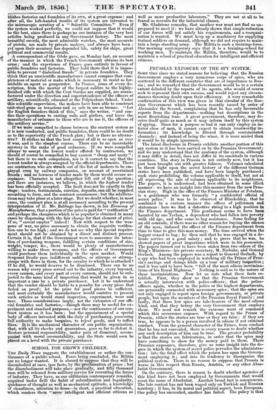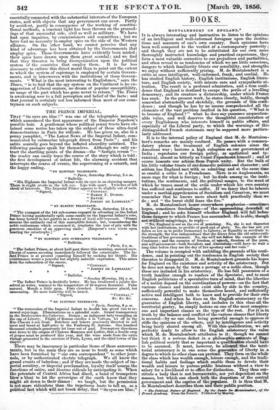PRUSSIAN EXPOSURE OF THE SPY SYSTEM.
SOME time since we stated reasons for believing that the Russian Government employs a very numerous corps of spies, who are scattered in the different countries that are of importance to Rus- sia ; and we remarked that the Government would be to a certain extent deluded by the reports of its agents, who would of course seek to represent their own success, and would reject any circum- stances throwing doubt upon their efficiency. A very remarkable confirmation of this view was given in that circular of the Rus- sian Government which has been recently issued' by order of Alexander the Second, complaining that ho has only favourable reports from the departments—nothing but descriptions in the most flourishing tone. A great government, therefore, may de- ceive itself quite as much as it may inform itself by this system of spying. Since for a purpose-so bad it can only employ an in- ferior class of men, it cannot expect to obtain trustworthy in- formation ; its knowledgeis filtered through contaminated channels ; and instead of being the wiser, it is more misled than it would be by simple ignorance.
The latest disclosure in Prussia exhibits another portion of this spy system as it has been carried on by the Prussian Government; and we may understand that the anatomy of the system,. although
it may differ in i detail, does not differ in its essentials in various countries. The story n Prussia is not entirely new, but it has just been brought out with greater, fulness. Volumes calculated to throw light upon the secret history of the different German states have been published, and have been largely pnrchased ; each state prohibiting the volume applicable to itself, but not at all repressing the sale of volumes applicable to its neighbours. The papers, it is understood, had been obtained in some illicit manner : we have an insight into this manner from the new Prus- sian story. High in the office of theTimmee Minister at Potsdam, is a gentleman who was formerly " a confidential official of secret police." It was to be observed of Hinekeldey, that he combined in a curious manner the offices of policeman and statesman : here we find a detective rising' to a high position in the Finance department. This gentleman seems to have. been haunted by one Techen, a dependent who had fallen into poverty with old age, and who came to beg assistance. Some feeling for an old comrade, if there was no other reason for buying the silence of the man, induced the officer of the Finance department from time to time to give this-man money. The time arrived when the beggar ceased to beg ; he then said that he was ein a de- licate service at a good salary • and to prove tnliatte! was, he showed papers of great importance which were in his possession. Thepapers turned out to have been stolen from two others of the King's 3linisters—his private secretary, M. NiebUhr, and General Gerlach. Among the papers was a report to General Gerlach, by a spy who had been employed in watching all the Prince of Prus- sia's sayings and doings while on a tour of military inspection ; and it was said to have been " full of the most odious incrimina- tions of his Royal Highness." Nothing is said as to the nature of these incriminations. Now let us note what these facts es- tablish. First, they show us that the Prussian Government is actually interwoven with police-officers ; that the police- officers again, whether in the police or the highest departments, are personally connected with mercenary spies ; that the spies are not only engaged to report upon foreign governments, or private people, but upon the members of the Prussian Royal Family ; and lastly, that these low spies are tale-bearers of the most odious kind, and that they betray the very Government that employs them. We need not remark the extreme want of command which this occurrence exposes. With regard to the Prince of Prussia, either the stories are true or they are false : if they are true, he appears to be a person involved in odious if not criminal conduct. From the general character of the Prince, from conduct that he has not concealed, there is every reason to doubt whether any such description of him can be true. The greater probability is that the stones are fabrications, in order that the spies may have something to show for the money paid to them. These Prussian exposures, therefore, give •us some insight into the de- gree in which the sy-stem of secret police pervades the administra- tion ; into the fatal effect which the poison has upon the Govern- inent employing it ; and into, its tendency to disorganize the political system. There is no reason to suppose that Prussia is worse in this respect than Russia, Austria, or any other Abso- lutist Government. On the contrary, there is reason to doubt whether agencies of this kind have not been employed by Governments that would scout the name of Absolutist. Another broad fact is conspicuous. The late contest has not been waged only on Turkish and Russian territory; it has, in its moral and political aspect, been European. One policy has succeeded, another has failed. The policy is that
essentially connected with the substantial interests of the European states, and with objects that any government can avow. Partly by accident, partly in consequence of the working of constitu- tional methods, a constant light has been thrown on the proceed- ings of that successful side, civil as well as military. We have had open inquiries, by commissioners and committees ; but we have had no necessity to employ spies on the side of the Western alliance. On the other hand, we cannot perceive that any kind of advantage has been obtained by the Governments that employ spies. Those Governments have evidently been misled ; their spies have drawn upon them great scandal ; and we find that they threaten to bring disorganization upon the political system of the countries that employ them. It is far less necessary to enforce this direct moral than to point out the extent to which the system of espionage is employed by certain Govern- ments, and is interwoven with the institutions of those Govern- ments. " What is the most interesting to Englishmen," says the Times, " is to find that the spy system on the Continent is no ex- aggeration of Liberal orators, no dretam of popular susceptibility, no usage of the past which has gone never to return." . The Times is awakening now to a. full perception and belief of the facts ; and that journal is certainly not less informed than most of our coun- trymen on such subjects.



























 Previous page
Previous page